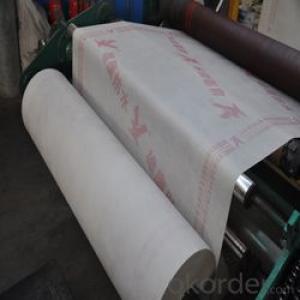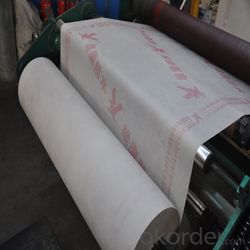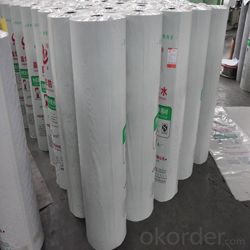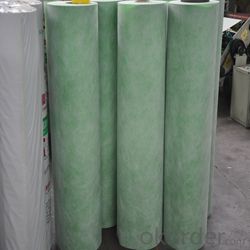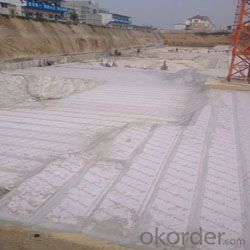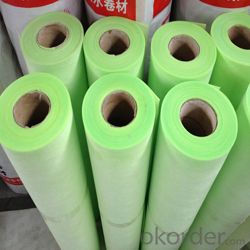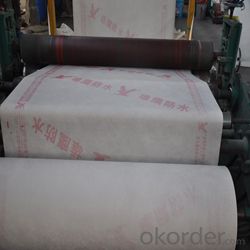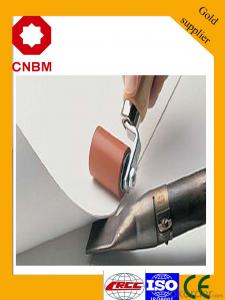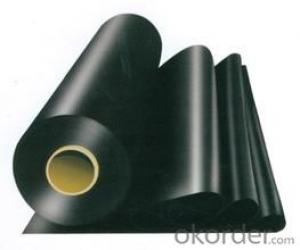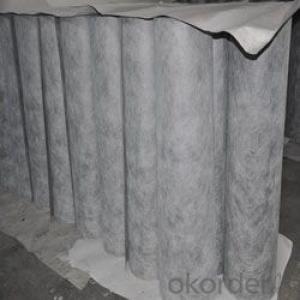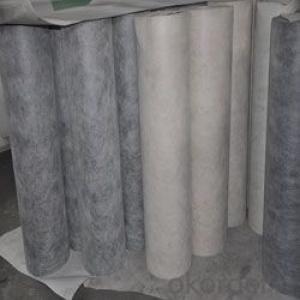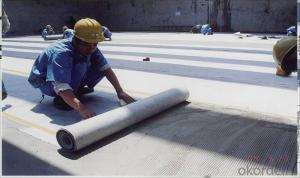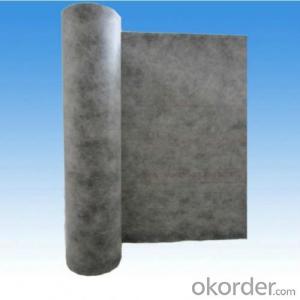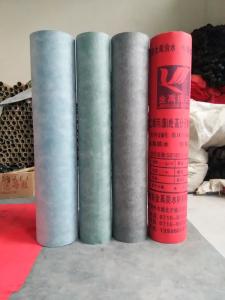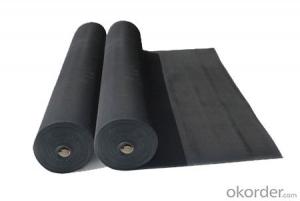High polymer PP and PE waterproof membrane
- Loading Port:
- Qingdao
- Payment Terms:
- TT OR LC
- Min Order Qty:
- -
- Supply Capability:
- 1100000 m²/month
OKorder Service Pledge
OKorder Financial Service
You Might Also Like
High Polymer polyethylene polypropylene composite
waterproof membrane
PP+PE+PP composite waterproof membrane is made by multipleply different materials,
especially its aging and weathering resistance layer enables the membrane possess
more longer effective age. It can bond with many kinds of adhesions, firm and secure.
In case of cement-base, cementations agent can be used, the cementationsagent
can easily enter into the non-woven felt layer, forms a well-combination with cement
after solidification, permanent durability.
1.Specifications:
2.Core Material: PE, EVA
3.Color: black, white, green, grey
4.Weight: 300g/m2-800g/m2
5.Length: 100M, 50M
6.Width: 1.15M, 1.20M, 1M
7.Thickness: 0.6mm-1.5mm
8.Technics: Heat synthesis
9.Payment: T/T
10.Port: Qingdao
11.Origin: CHINA
12.Packaging & Delivery: Packed in roll, will deliver after 7-14 days after receive the prepayment
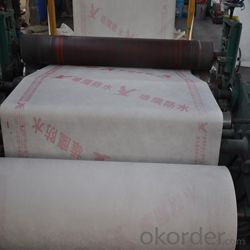
Characteristic:
1. Non-toxic, no pollution, environmental protecting product.
2. Can be used for many different surfaces, especially for cement basement.
3. Tough, impermeable, multi-layered sheet;
4. High tension strength, good cold flexibility.
Application:
Products used in roofing, basement, restroom, water conservation, warehouse to
protect structure from water infiltration.
Construction:
1.The application is simple and no-pollution. It is mainly used in the middle of building
for waterproofing. On this layers of protection and decoration are needed;
2. When application, pour the adhesive materials homogeneously on the smooth roof
deck, then roll the membrane to make is fully adhered to the deck.
3. The adhesive materials are usually made form cement or other building glue
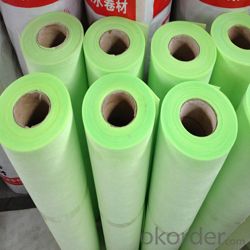
- Q: Can a waterproofing membrane be used for a balcony?
- A balcony can indeed use a waterproofing membrane. Its purpose is to safeguard against water infiltration and shield surfaces from moisture-related harm. Since balconies are exposed to the elements and vulnerable to water damage, it is crucial to apply a waterproofing membrane in order to prolong their lifespan and maintain their structural soundness. By applying the membrane to the surface of the balcony, a barrier is created that effectively prevents water from seeping through cracks or joints. Consequently, this safeguards against water-related issues such as leaks, mold, and deterioration of structural components. It is of utmost importance to choose a high-quality waterproofing membrane that is specifically suitable for outdoor use and capable of withstanding exposure to UV rays, temperature fluctuations, and foot traffic. Consulting a professional contractor is recommended to ensure proper installation and to select the most appropriate waterproofing system tailored to the specific needs of your balcony.
- Q: Are waterproofing membranes suitable for balconies and terraces?
- Yes, waterproofing membranes are suitable for balconies and terraces as they provide an effective barrier against water infiltration, protecting the underlying structure from potential damage caused by moisture.
- Q: How does a waterproofing membrane compare to other waterproofing methods?
- Compared to other traditional waterproofing methods, a waterproofing membrane stands out in several ways: 1. Unmatched Protection: When it comes to keeping water out, a waterproofing membrane is unparalleled. Unlike waterproof paints or coatings, which may crack or peel, a membrane forms a continuous and seamless barrier that can withstand extreme weather conditions. 2. Long-Lasting: Designed to be durable, waterproofing membranes are made from materials like rubber, PVC, or modified bitumen that resist wear and tear. This ensures that they provide a reliable waterproofing solution for many years. 3. Versatility at its Best: Waterproofing membranes can be applied to various surfaces, including concrete, metal, and wood. They are suitable for a wide range of applications such as roofs, basements, foundations, and tunnels, making them ideal for both residential and commercial projects. 4. Flexible and Adaptable: Thanks to their flexibility, waterproofing membranes conform to the shape and contours of the surface they are applied to. This quality allows them to accommodate any structural movements or shifts, preventing potential cracks or gaps that could lead to water leakage. 5. Easy to Install: Professionals or experienced DIYers can easily install waterproofing membranes. The process involves rolling out the membrane onto the surface, adhering it with adhesive or heat-welding, and sealing the edges and seams. This simplicity of installation makes it a popular choice for new construction and retrofit projects alike. 6. Cost-Effective Investment: Although the initial cost of installing a waterproofing membrane may be higher compared to other methods, its long-term cost-effectiveness makes it a wise investment. The durability and longevity of the membrane result in fewer maintenance and repair costs over time, saving money in the long run. In conclusion, a waterproofing membrane surpasses other waterproofing methods in terms of protection, longevity, versatility, flexibility, ease of installation, and cost-effectiveness. Its ability to provide a continuous and reliable barrier against water intrusion makes it the preferred choice for many construction projects.
- Q: Are waterproofing membranes suitable for historical preservation projects?
- Waterproofing membranes can be suitable for historical preservation projects, depending on the specific circumstances and goals of the project. Waterproofing membranes are designed to provide a protective barrier against water infiltration, which can help to prevent damage to historical structures caused by moisture. In some cases, historical buildings may have existing waterproofing systems that are deteriorated or no longer effective. In these situations, the use of modern waterproofing membranes can be a viable option to protect and preserve the structure. These membranes can be installed discreetly, without altering the original appearance or architectural integrity of the building. However, it is crucial to approach the use of waterproofing membranes in historical preservation projects with caution. The potential impact on the authenticity and historical value of the structure must be carefully evaluated. Some historical buildings may have unique construction methods or materials that require specialized preservation techniques. In such cases, alternative preservation methods that do not involve the use of membranes may be more appropriate. Additionally, it is important to consider the long-term consequences and maintenance requirements of waterproofing membranes. Some membranes may have a limited lifespan, and periodic inspections and maintenance may be necessary to ensure their continued effectiveness. This ongoing maintenance should be factored into the overall preservation plan and budget. Ultimately, the decision to use waterproofing membranes in historical preservation projects should be based on a thorough assessment of the specific needs and characteristics of the building, as well as the preservation objectives. Consulting with preservation experts, architects, and engineers can help to determine the most suitable approach for each unique project.
- Q: Are waterproofing membranes resistant to salt damage?
- Yes, waterproofing membranes are generally resistant to salt damage. They are designed to protect against moisture and other environmental factors, including saltwater. The membranes are specifically engineered to provide a barrier that prevents water and salts from infiltrating and causing damage to underlying structures.
- Q: How does a waterproofing membrane handle joint or crack movements?
- A waterproofing membrane is designed to handle joint or crack movements by being flexible and accommodating the expansion and contraction of the underlying structure. It can stretch and move with the joints or cracks, ensuring that it remains intact and provides a continuous barrier against water penetration.
- Q: Can a waterproofing membrane be used for loading dock levelers and pit walls?
- Yes, a waterproofing membrane can be used for loading dock levelers and pit walls. Waterproofing membranes provide a protective barrier against moisture and can help prevent water damage and leakage in these areas.
- Q: Can a waterproofing membrane be used in geotechnical applications?
- Yes, a waterproofing membrane can be used in geotechnical applications. It is commonly used to prevent water infiltration in structures such as tunnels, retaining walls, and basements. The membrane acts as a barrier, effectively sealing the structure and protecting it from water damage.
- Q: Can a waterproofing membrane be used for food processing facilities?
- Yes, a waterproofing membrane can be used for food processing facilities. These membranes are specifically designed to prevent water penetration and can be installed in areas where food is processed to ensure a hygienic and moisture-resistant environment.
- Q: Are there any specific considerations for installing a waterproofing membrane on sloped surfaces?
- Yes, there are specific considerations for installing a waterproofing membrane on sloped surfaces. One important consideration is the slope gradient, as steeper slopes may require additional measures to ensure proper adhesion and prevent water pooling. Another consideration is the type of waterproofing membrane used, as some membranes may be better suited for sloped surfaces to provide adequate drainage and prevent water penetration. Additionally, proper surface preparation and installation techniques are crucial to ensure the membrane is properly applied and can withstand the stresses of a sloped surface.
Send your message to us
High polymer PP and PE waterproof membrane
- Loading Port:
- Qingdao
- Payment Terms:
- TT OR LC
- Min Order Qty:
- -
- Supply Capability:
- 1100000 m²/month
OKorder Service Pledge
OKorder Financial Service
Similar products
Hot products
Hot Searches
Related keywords
